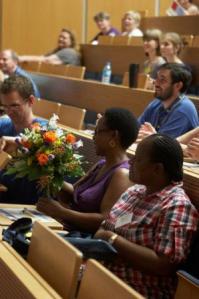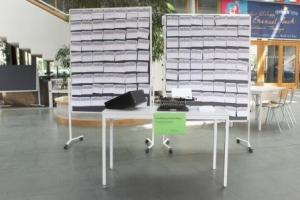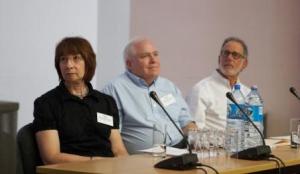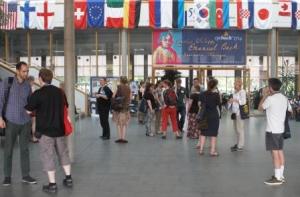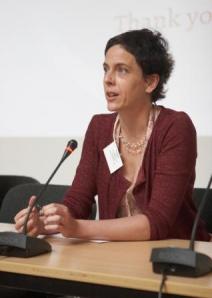Writing Centers in Motion EWCA Conference 2014
Oktober 21, 2014 1 Kommentar
Thank you all for this successful conference! It has been a great pleasure and honour to host you here at European University Viadrina on the river Oder, on the German-Polish border right at the heart of Europe. During our conference from July 19th to July 22nd 2014 we could welcome you, over 200 people from 36 nations, to present, discuss and share their thoughts, ideas and opinions about this year’s main motto “Let’s peer across Borders, Writing Centres in motion”. A motto encouraging us to cross all kinds of borders: the borders of our many different home countries, language and cultural borders and not least, the metaphorical borders of the different discourse communities and writing cultures. The motto further involved peering into writing centre work as an idea of collaborative learning: A method situated right in the centre of writing center theory and practice. With a pre-conference peer tutor day, a peer tutor presentation track, workshop track and keynote, we could also gather many peer writing tutors from all over the world and so make the conference a collaborative learning event. Especially our youngest researchers so had the chance to gain some experience at an international conference and to socialise with people from all over the world.
On four days the Campus has been busy as a beehive with writing enthusiast even though subtropical summer temperatures gave us a bit of a hard time. However, as our conference team and our many helpers provided everyone with water and refreshing tissues, no one bothered too much.
Many of you enjoyed the possibility to connect with one another at our idyllic Conference Barbecue at Ziegenwerder, well prepared against cheeky insects. Others joined a trip to explore the city of Frankfurt (Oder) or took part in our history trip to „Dokumentationszentrum Alltagskultur der DDR“ in Eisenhüttenstadt.
We hope you had a great time participating at the conference with the academical programme we provided and the leisure time activities, we offered to give you the possibility to relax in between. We hope that you could share your ideas and visions, got inspired by each other’s research, could enrich your networks and make some new friends.
The only thing left to say regards writing centers increasing importance across the globe, stressed by your many different home countries: A rising interest in our work can make us all proud and encourage our growing community to keep developing. We are strikingly in motion!
Please scroll down for some impressions from the conference our Peer Tutors would like to share with you:
The Contribution of Peer Writing Tutors to the sustained Development of Writing Centers
It was a huge honour for me to present the process and results of my empirical research for my master thesis as a keynote at the EWCA conference 2014. My research was on the subject
of “The Contribution of Peer Writing Tutors to the sustained Development of Writing Centres“ which I conducted from September 2013 till April 2014. I developed a prezi-presentation for the international EWCA 2014 audience focusing on the background information (research questions, aim, hypothesis, and research method), the research process (data collection and analysis) and the results. The presentation is available on request. The German speaking audience can find my master thesis published here: http://opus.kobv.de/euv/volltexte/2014/92/pdf/Masterarbeit_Poloubotko.pdf
I was very moved by the elaborate introduction of Dr. Katrin Girgensohn concerning my five-years work at the writing centre at European University Viadrina and my engagement within the EWCA as a researcher and board member. Moreover was I truly touched and overwhelmed by the positive response to my keynote presentation. The standing ovation still feels like a dream. It was great to have the support from all the peer tutors which I got to know at different (peer tutoring) conferences and during the European Peer Tutor Day 2014. It was really fantastic to be in charge of organising the Peer Tutor Day and a pre-conference event for exchange and networking among peer tutors from writing centres worldwide. (For more information on the Peer Tutor Day please see another blog article.)
Anja Poloubotko
A new Method for collaborative Writing
While we tend to think that it is difficult (or at least challenging) to write a piece of text together, a group of writing tutors from Goethe Universität at Frankfurt (Main) presented an
interactive workshop to experiment with a new, self-invented method. At first, we brainstormed about what collaborative writing means (for example working on the same text together, rather than writing a chapter each), and reflected on experiences, we may have had. Next, we shifted to the experimental part of the workshop: splitting up in groups of two, we received instructions to write a page of text in any style we would like (news article, diary entry, poem, fairytale…) about how we imagine our ideal writing centre to look like, therefore only using three main ideas. Key to the exercise was the time limit of 30 minutes, during which each pair of authors had to organise themselves around which type of text to write, writing the actual text and editing a final version.
When sharing our texts back in the group, we discussed our experiences and found that this method could come in useful for future collaborative writing projects. We were surprised to find that we were able to get a lot done in the short time provided!
Juliane
Short Impression of the Workshop „When Tutor meets Tutor“
Being a Peer Tutor myself, I completely enjoyed taking part in the workshop. The two Workshop leaders started by explaining how the idea for pursuing this topic has come into their minds: At the Writing Center of the European University Viadrina, where both of them are working, it sometimes happened, that no student at all was attending the writing consultation. Hence they decided to use this time to have a tutoring session for and by themselves, i.e. a peer to peer writing consultation. They realised that this could be quite fruitful and interesting so they decided to share their experiences with us. During the Workshop we got together in pairs and had a peer-to-peer- writing consultation on our current writing projects.
In the end we summed up, that this is a really interesting experience due to our different backgrounds and due to the consciousness that we were consulting another peer tutor, who probably knew as much about writing methods and strategies as ourselves. It was different but really helpful!
Maike Tjaden
My Favourite Project
From all the interesting and inspiring presentations I listened to during the EWCA conference, there is one project I immediately thought of, when a colleague asked me to write a comment for this blog. The presentations name was „How I Write, Ireland“, a contribution by the University of Limerick in Ireland. It consisted of a series of interviews with prolific Irish writers in which the authors answered questions concerning both their individual writing process in general and the strategies they used to reach a particular writing goal.
The University of Limericks Regional Writing Center provides not only the interviews’ video recordings but further transcripts and possible outlines for a teachers lesson. That way, the interviews can be used as a learning tool by both, staff and students. Further, the Writing Center wishes to collect some data about how teachers use the interviews in their attempts to help improve students writing.
While giving information about the project in their presentation “How I Write, Ireland: Sharing the Experiences, Processes, and Strategies of Prolific Writers“, Lawrence Cleary and Aoife Lenihan were showing some sequences of the interviews. Even if these tiny snippets have only been providing the audience with small insights in the interviewees writing processes, they were really interesting for me. I was surprised to hear from professor Tom Moylan that he – after numerous published works – is still struggling with his role as a writer, feeling that his working-class background keeps him from really belonging to the scientific community he is actually writing for. This made me think of my own experiences as a student and a Peer Tutor: A lot of students feel insecure when discussing their writing projects with their lecturer – a person they expect to know everything, while they consider themselves to know nearly nothing. For this reason some of them choose to dismiss their own ideas and strictly follow the lecturers impulses instead. Doing so, they are disempowering themselves from pursuing their own style and developing new ideas and thoughts. Likewise, a lot of them, at times including myself, consider themselves to write for credit points only instead of writing for an academic audience. They simply feel to young and inexperienced to contribute to the world of science – following these trains of thoughts, a lot of them do not recognise the actual worth of their writing. In my view, this is a pity and I am sure that a lot of ideas get lost due to a lack of self-confidence from student writers. To show them that even their professors face similar problems during the writing process could be one way to improve students confidence with their work and to consider themselves as members of the academic community. At the same time, the project offers them the opportunity to hear about strategies that might help them during their own writing process. To conclude, I really like this project and I think the concept can provide students with a lot of ideas that are worth to think about.
Anne Kirschbaum
